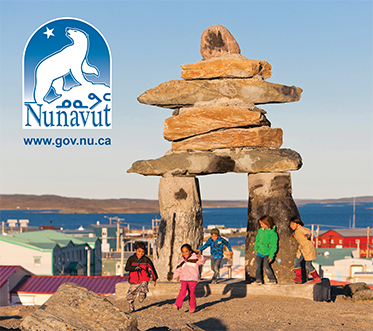Judo blowout marks farewell to Iqaluit teacher
Hundreds gather at year-end competition
JOHN THOMPSON
Hudson Lester couldn’t believe how quickly it ended.
For several minutes the Grade 7 student held in his clutches a smaller Inuk rival as they struggled on the mats. Then he was pinned on his back.
Hudson is just one of several hundred judo students from three Iqaluit schools, gathered under the dim flourescent lights of the Arctic Winter Games arena on Friday, May 26.
It’s their end-of-year competition, a demonstration of what they’ve learned since September.
It’s also the last time, probably, that such an event will be held.
Mario Desforges started Judo Nunavut five years ago. This year he single-handedly taught, at his guess, 600 students from three schools. He leaves for Ottawa on June 22, and school-hour judo will end.
Fellow judo practitioners, or judokas, are quick to say no one can take his place.
Desforges started the school judo program for kids at risk — students with fetal-alcohol spectrum disorder, attention deficit disorder and other behavioral problems. At first, teachers thought he was joking when he suggested he could teach hard-to-handle kids how to fight.
“I don’t speak good enough. They think I’m crazy,” the Montreal native says.
But violence happens in school when kids lose control. Judo teaches self-discipline, as well as respect for elders, and respect for themselves, said Darlene Nuqingaq, principal of Aqsarniit Middle School.
“We don’t have a gym teacher, so it’s awesome that he volunteers all his time,” she says of Desforges.
Some parents were skeptical at first, she says. They wanted to know why their kids were being taught something Japanese, rather than from their own culture.
Judo means “the gentle way” in Japanese – a funny name for the art of throwing, choking and twisting the limbs of your opponent. Its name comes from how you don’t need to be big to win in the sport, if you use your opponents’ momentum to throw them off balance and on to the mat, then wrestle them into submission.
After parents saw results from the judo school program, they stopped complaining.
Desforges, 41, is a brawny Québecois who grew up in Montreal’s Villemont district. He started judo at age seven. As a young man, he says he carried a stick with him as he walked to the gym to fend off street toughs.
“Where I’m from, judo, it helped me a lot. I wasn’t so good at school,” he says.
No surprise he easily identifies with the kids he trains. “He’s a rough kid, but he’s got a good heart,” he says of one student.
He adds if he doesn’t help kids, one day they could face his wife, Crown lawyer Christine Gagnon, in court.
Last year Judo Québec recognized Desforges as Educator of the Year. He’s been nominated again this year, and was a runner up two years ago.
Despite all this, he says he can no longer live off scraps of funding from a half-dozen sources. At various points, Judo Nunavut has been funded by national crime-prevention money and bingo funds collected by Nunavut’s John Howard Society; Nunavut’s Department of Cultural, Language, Elders and Youth; the federal Brighter Futures program; Iqaluit’s district education authority; and Sport Nunavut.
Still, Desforges says it doesn’t add up to much for what’s become a full-time job.
“I can’t live with $10,000 a year. My wife supports me,” Desforges says.
Judo Nunavut’s best-known success story is Nathalie Martel, a 15-year-old blue belt who became the first-known Inuk judoka to win an international bronze medal last fall.
More recently, last month she travelled to Germany for the Berlin International Open with 10 other teens and a dozen coaches from Canada.
She only fought once at this competition, and it ended quickly, in favour of her opponent. “She just rolled me over,” Martel says.
Still, Martel spent several hours each day training with the German team. She left covered with scratches and bruises, and with a better idea of how judo’s done in Europe.
“She’s a natural,” Desforge says of Martel. “She’s lucky. But to be a success, you need to train hard.”
Martel is also a talented speed skater, and training for both sports is an increasingly difficult balancing act.
In April Martel skipped a month of judo to train for a speed-skating competition in Edmonton. She didn’t do well, she says, and knows that soon she’ll have to give up one sport to focus for the upcoming 2007 Canada Winter Games. “I’ll need to choose,” she says.
Deforges has older students too. Robert Tookoome, 39, joined three years ago and is now a blue-belt.
“I’ve lost 40 pounds, and it’s helped me focus,” he says.
Many hoped Tookoome would take Deforges’ place. But Tookoome’s since decided to return to school at Trent University in September, while working towards a brown belt.
“It’s going to be a big loss to the community,” Tookoome says of Desforges’ departure. “He’s put in so much time and energy.”
“No one is going to take his place.”
For the dedicated, weekly evening classes held by the Judo club will likely continue, under the instruction of Jo-Anne Falkiner and Gord MacKay.
Meanwhile, Desforges’ future in Ottawa is unclear.
“I don’t know. Maybe I’ll do judo,” he says. “I’ll find my way.”
But he knows he’ll stay in touch with his students in Iqaluit, by emailing them training regimes.
He also expects he’ll see them at competitions he’ll be attending with his 12-year-old daughter, Gabrielle, who he says could be a national champion in a few years.
“When the kids go to the competitions, I’ll be there,” he says.
“Me, nobody pushed me. The kids, now, will have to push themselves.”





(0) Comments